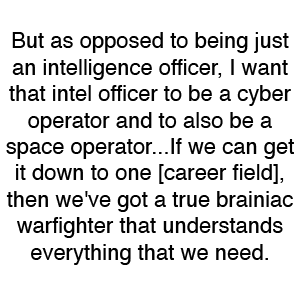U.S. Space Force ISR Director Shares What's Ahead
January 7, 2021
 On Wednesday January 6th, INSA’s Vice President for Policy, Larry Hanauer, sat down with Major General Leah Lauderback, Director of Intelligence, Surveillance, and Reconnaissance (ISR) for the U.S. Space Force to discuss the Force’s principal mission, top priorities, and biggest challenges ahead.
On Wednesday January 6th, INSA’s Vice President for Policy, Larry Hanauer, sat down with Major General Leah Lauderback, Director of Intelligence, Surveillance, and Reconnaissance (ISR) for the U.S. Space Force to discuss the Force’s principal mission, top priorities, and biggest challenges ahead.
General Lauderback highlighted her top six priorities, including the establishment of a warfighting culture in the Space Force, further development of headquarters, the ISR directorate and the National Space Intelligence Center (NSIC), building up robust manpower and capabilities in tactical units at the operational level, the Space Force becoming a formal member of the IC, and advancing ISR capabilities to persistently and consistently identify and characterize threats in the space domain.
General Lauderback spoke about long-term threats from Russia and China, highlighting recent Russian testing of missiles designed to destroy low earth orbit satellites and innovative Chinese satellites with advanced robotic arms. She expressed concern about these advancing technologies that may be used as more than just a deterrent in the future of space warfare.
She also discussed the importance of collaboration and information sharing with both foreign and domestic partners in government and industry. General Lauderback highlighted the need to prioritize robust intelligence sharing agreements with close allies, the value of industry partnerships to make the Force entirely digital and leveraging intelligence capabilities from counterparts within the Intelligence Community. She was enthusiastic in discussing development of the new National Space Intelligence Center (NSIC), which will adopt the Space Analysis Squadron and the Counter-Space Analysis Squadron units from the Air Force’s National Air and Space Intelligence Center (NASIC).
Finally, General Lauderback emphasized how the Force aims to attract and retain a skilled workforce, by breaking down five career fields into one. Given the small size of the Force, General Lauderback believes her team will be able to prioritize training on all fronts to ensure employees are equipped with the education, training, and resources necessary to understand major threats, the intelligence required to combat these threats, and how the Force will obtain and interpret this intelligence to help policymakers make key decisions.
